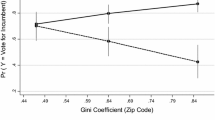Abstract
Distributional politics in modern democracy involves the exploitation of minorities by majorities, and as persons rotate membership, all parties in the “game” lose. This result emerges only becausedifferences in treatment are permissible. If the principle ofgenerality (analogous to that present in an idealized version of the rule of law) could, somehow, be introduced into politics, mutual exploitation could be avoided. The analysis offers support for such policies as (1) flat-rate taxes, (2) equal per head transfers or demogrants and (3) uniform regulation of all industries.
Similar content being viewed by others
References
Buchanan, J. M. (1993) “Public Choice After Socialism.”Public Choice: forthcoming.
Buchanan, J. M. and G. Tullock (1962)The Calculus of Consent. Ann Arbor: University of Michigan Press.
Author information
Authors and Affiliations
Additional information
The argument here was initially presented as a Liberty Fund Conference talk in July 1992 under the title “Political Ethics as a Criterion for Constitutional Design.” I am indebted to my colleagues Viktor Vanberg, and especially Hartmut Kliemt for helpful comments on an earlier draft.
Rights and permissions
About this article
Cite this article
Buchanan, J.M. How can constitutions be designed so that politicians who seek to serve “public interest” can survive and prosper?. Constit Polit Econ 4, 1–6 (1993). https://doi.org/10.1007/BF02393280
Issue Date:
DOI: https://doi.org/10.1007/BF02393280




